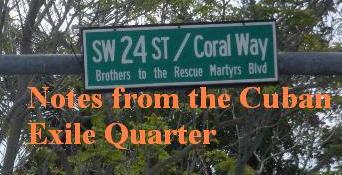"Those who steal the rights of others steal from themselves. Those who remove and crush freedom are the true slaves."- Harold Cepero Escalante, Havana 2002
"The talk today is of globalization, but we must state that unless there is global solidarity, not only human rights but also the right to remain human will be jeopardized." - Oswaldo Payá Sardiñas, Strasbourg, 2002
Over Facebook this morning, January 22, 2014, the Christian Liberation Movement published the following message:
At the same time as the cause of justice for Oswaldo and Harold continues to be pursued it is important to recall that their legacy of nonviolence did not die with them, but their work continues to bear positive fruit in Cuba and around the world.
Oswaldo Payá had a dream that continues to inspire many inside and outside of Cuba:
Over twitter at 3:01pm on January 21, 2014 Rosa María Payá tweeted that Eduardo Cardet Conce was reporting that more than 50 self-employed were protesting in front of the Popular Power Assembly of Holguin asking to let them work, and that the response was repression. She went on to explain that the "small entrepreneurs" of Holguin are called "catreros" because they show their products on "catres" (cots) = makeshift beds with a tarp and 4 boards. She went on to explain the reason for the demonstration: "Before the ban on the sale of many products, that the Cuban government ordered, the catreros went out to protest and many were arrested."
She then concluded with two additional tweets tying into the need for rights instead of government permission and a call to solidarity with the protesters:
"The talk today is of globalization, but we must state that unless there is global solidarity, not only human rights but also the right to remain human will be jeopardized." - Oswaldo Payá Sardiñas, Strasbourg, 2002
 |
| Oswaldo and Harold |
"Today it's been a year and a half that Oswaldo Payá and Harold Cepero were killed . We will continue demanding an independent investigation because it is right and to put an end to impunity. Will continue to do so despite the complicity of those who, knowing the truth, do not want it to come to light, and despite the indifference of others inside and outside of Cuba."Time passes and the deaths of Oswaldo Payá and Harold Cepero raise more and more questions. The initial story of the Cuban government that a lone car lost control and hit a tree killing the two activists has been demonstrated to be a fabrication. As time has passed and the evidence multiplied it is now evident that the car was hit by a second vehicle driven by Cuban state security agents. Furthermore there is evidence that both Oswaldo and Harold survived the crash. This led Rosa María Payá Acevedo on August 6, 2013 to ask over twitter:
A red Lada followed them, a blue car hit them from behind, but they were still alive. What did they do with my father, Oswaldo Payá and Harold Cepero?The Payá and Cepero families are not along in asking what happened and calling for an international investigation. The Washington Post Editorial board along with 127 dignitaries including Nobel Laureate Desmond Tutu have called for an international investigation into these two deaths.
At the same time as the cause of justice for Oswaldo and Harold continues to be pursued it is important to recall that their legacy of nonviolence did not die with them, but their work continues to bear positive fruit in Cuba and around the world.
Oswaldo Payá had a dream that continues to inspire many inside and outside of Cuba:
"The rifles will be buried face down, the words of hatred will vanish in the heart without reaching the lips, we'll go out into the street and all of us will see in the other a brother, let us look to the future with the peace of he that knows that he forgave and he that has been forgiven. Let there be no blood to clean or dead to bury, the shadow of fear and of catastrophe will give way to the reconciliatory light, and Cuba will be reborn in every heart, in a miracle of love made by God and us."On January 21, 2014 in the far eastern city of Holguín over a thousand Cubans took to the streets to nonviolently demand their rights reported Cubanet. News of the demonstration spread over social media. Franklin Peregrino in an interview with Radio República explained how state security detained activists trying to report the protests. However, intrepid activists managed to circumvent the efforts of state security and were able to obtain images, videos, and audios to let the world know what had taken place. Reports continued to arrive that on the morning of January 21st between 100 and 150 demonstrators with posters continued their demonstration despite being beaten up and a thousand onlookers gathered around the protestors. One of the leaders of the demonstration, William Reinaldo Zaldívar Pérez, " was taken out of the government headquarters handcuffed and his whereabouts are unknown." The reason for the protest is self-evident the Cuban government is next to last in rankings on economic freedom. Its ally North Korea is dead last.
 |
| Demonstration in Holguin on January 21, 2014 |
She then concluded with two additional tweets tying into the need for rights instead of government permission and a call to solidarity with the protesters:
Plebiscite Now! For Cubans to have the right to undertake private businesses and not the permission of the will of the government. Solidarity with "catreros" arrested in Holguin for the citizen to be free and then enterprise will be free too. Plebiscite PV.This was not a demonstration organized by Cuban dissidents, but a spontaneous protest by Cubans not previously active demanding their rights. Oswaldo and Harold's dream lives on and the work for a nonviolent democratic transition in Cuba continues.





No comments:
Post a Comment